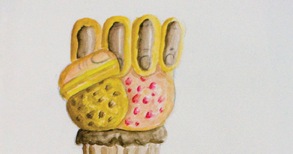
Few things are less controversial in our hyper-partisan world than cupcakes. Yet last week cupcakes found themselves at the heart of a heated debate concerning racism and affirmative action.
The tension began with the University of California Berkeley’s College Republican Club’s “Increase Diversity Bake Sale” and its unusual price structure. The suggested prices for cupcakes sold at the bake sale were $2 for whites, $1.50 for Asians, $1 for Latinos, 75 cents for blacks and 25 cents for Native Americans. Women got 25 cents off any pastry.
The clearly discriminatory stunt was held in protest of a phone bank set up on UC Berkeley’s campus by the Associated Students in favor of a new affirmative action law awaiting Gov. Jerry Brown’s signature. The law, SB 185, would allow the UC and California State University systems to consider ethnicity and gender for admission decisions. If signed, the new law would directly challenge the voter-approved Prop. 209 passed in 1996 that forbade schools from giving exactly that kind of preferential treatment.
The bake sale was met with the expected counter-protests: Some protesters handed out complimentary “cupcakes of conscience.” Others lay down in front of the sale, presumably to make a point about either discrimination or standing.
What the protesters were arguing is that it’s wrong to charge individuals different prices based on race or gender. They are right. It is intrinsically wrong to treat anyone differently because of their gender or ethnicity. Even the Berkeley College Republicans agree, which is why they hosted the sale in the first place, hoping to draw a parallel between it and the affirmative action policies of SB 185.
Of course, supporters of affirmative action refuse to draw such connections. They claim minorities in this country face special challenges brought on by decades of racism and discrimination. For example, Latinos, African-Americans and Native Americans tend to be substantially less wealthy, with median incomes about $20,000 less than whites and Asians. Proponents of affirmative action say affirmative action is simply giving minorities their due, making up for long-standing policies that for generations gave preferential treatment to certain ethnic groups and genders ahead of others. Somehow, proponents of affirmative action fail to see the hypocrisy in their reasoning. They fail to see how their well-meaning plans to create diversity are innately discriminatory and wrong.
To start, SB 185 fails to explain who decides which minorities get preferential treatment and how much of it. One method to do so is to determine how well-represented a group is within the UC system. But this tactic causes problems: Asians are overrepresented by almost 200 percent and women by 10 – 15 percent in college. With a finite number of students in the UC system, does that mean the goal of SB 185 is to reduce the number of Asians and women in UC schools — two of the very minorities affirmative action pledges to defend?
Maybe a different method would be better. Supporters of affirmative action love to talk about historic inequalities. Ironically, whites are currently underrepresented in college by nearly 30 percent. Some believe Native Americans should get the most preferential treatment because they are usually the numerically smallest ethnicity in colleges. However, African-Americans and Latinos are statistically less represented.
Eventually affirmative action becomes little more than a discriminatory quota based on outdated ideas of race, gender and the definition of a diverse school.
To create such a blanket policy of who needs help based on race or gender is innately inefficient and morally wrong. It saddles individuals with “historic challenges” they may or may not have actually faced. And it draws attention away from those who are truly in need. Preference should be earned by overcoming demonstrable personal challenges, not won by genetic happenstance.
There are many better ways to increase diversity. Giving preference to applicants from schools with particularly high drop-out rates or from families without a history of college education is easily done. It rewards individual achievement. And minorities who tend to face those challenges more because of historic inequalities will receive the majority of the preferential treatment. Not because of genetic luck, but because they have shown they truly need it.
It is wrong to assume an individual is less able to afford a cupcake because of his or her race or gender. And it is wrong to assume that same individual is less able to be a competitive college applicant because of his or her race or gender. Until we understand that, discriminatory policies such as SB 185 will continue to exist.







